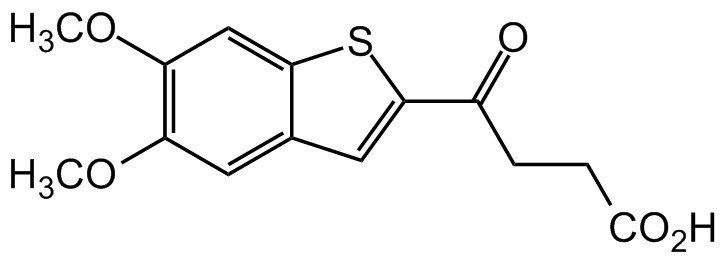MSA-2
Product Code:
AG-CR1-0164
AG-CR1-0164
Regulatory Status:
RUO
RUO
Shipping:
AMBIENT
AMBIENT
Storage:
Short Term: +4°C, Long Term: -20°C
Short Term: +4°C, Long Term: -20°C
No additional charges, what you see is what you pay! *
| Code | Size | Price |
|---|
| AG-CR1-0164-M001 | 1 mg | £45.00 |
Quantity:
| AG-CR1-0164-M005 | 5 mg | £150.00 |
Quantity:
Prices exclude any Taxes / VAT
Stay in control of your spending. These prices have no additional charges, not even shipping!
* Rare exceptions are clearly labelled (only 0.14% of items!).
* Rare exceptions are clearly labelled (only 0.14% of items!).
Multibuy discounts available! Contact us to find what you can save.
This product comes from: Switzerland.
Typical lead time: 7-10 working days.
Contact us for more accurate information.
Typical lead time: 7-10 working days.
Contact us for more accurate information.
- Further Information
- Documents
- References
- Show All
Further Information
Alternate Names/Synonyms:
4-(5,6-Dimethoxybenzo[b]thiophen-2-yl)-4-oxobutanoic acid
Appearance:
White to off-white solid.
CAS:
129425-81-6
EClass:
32160000
Form (Short):
liquid
Handling Advice:
Keep cool and dry.
InChi:
InChI=1S/C14H14O5S/c1-18-10-5-8-6-13(9(15)3-4-14(16)17)20-12(8)7-11(10)19-2/h5-7H,3-4H2,1-2H3,(H,16,17)
InChiKey:
APCLRHPWFCQIMG-UHFFFAOYSA-N
Long Description:
Chemical. CAS: 129425-81-6. Formula: C14H14O5S. MW: 294.3. MSA-2 is a new orally available non-nucleotide STING (STimulator of INterferon Genes) agonist, with EC50s of 8.3 and 24µM for human STING isoforms WT and HAQ. Activation of the STING protein by its natural ligand, cyclic guanosine monophosphate-adenosine monophosphate (cGAMP, a cytosolic double-stranded DNA sensor), triggers signaling responses, inducing the release of type I interferons and other proinflammatory cytokines. STING-controlled interferon production is involved in antiviral defense as well as antitumor immunity. Pharmacological activation of STING is considered a promising therapeutic strategy for cancer. MSA-2 highly induces secretion in vitro of IFN-beta from THP-1 cells and mouse macrophages at concentration of 10-50µM. It shows in vivo antitumor activity in a MC38 mouse model of colon carcinoma in a dose-dependent manner, stimulating IFN-beta secretion in tumors, inducing tumor regression with durable antitumor immunity when administered intratumorally (450µg), subcutaneously (50mg/kg) or orally (50mg/kg), and synergizes with anti-PD-1 therapy. MSA-2 is a small molecule monomer that undergoes reversible, noncovalent dimerization in solution to become a pharmacologically active ligand. MSA-2 monomers cannot bind STING, whereas the noncovalent MSA-2 dimers bind STING with nanomolar affinity. MSA-2, a weak acid, exhibits substantially higher cellular potency in an acidified tumor microenvironment (versus normal tissue), owing to increased cellular entry and retention combined with its inherent mode of interaction with STING.
Molecular Formula:
C14H14O5S
Molecular Weight:
294.3
Package Type:
Vial
Product Description:
MSA-2 is a new orally available (cell permeable) non-nucleotide STING (STimulator of INterferon Genes) agonist, with EC50s of 8.3 and 24µM for human STING isoforms WT and HAQ. Activation of the STING protein by its natural ligand, cyclic guanosine monophosphate-adenosine monophosphate (cGAMP, a cytosolic double-stranded DNA sensor), triggers signaling responses, inducing the release of type I interferons and other proinflammatory cytokines. STING-controlled interferon production is involved in antiviral defense as well as antitumor immunity. Pharmacological activation of STING is considered a promising therapeutic strategy for cancer. MSA-2 highly induces secretion in vitro of IFN-beta from THP-1 cells and mouse macrophages at concentration of 10-50µM. It shows in vivo antitumor activity in a MC38 mouse model of colon carcinoma in a dose-dependent manner, stimulating IFN-beta secretion in tumors, inducing tumor regression with durable antitumor immunity when administered intratumorally (450µg), subcutaneously (50mg/kg) or orally (50mg/kg), and synergizes with anti-PD-1 therapy. MSA-2 is a small molecule monomer that undergoes reversible, noncovalent dimerization in solution to become a pharmacologically active ligand. MSA-2 monomers cannot bind STING, whereas the noncovalent MSA-2 dimers bind STING with nanomolar affinity. MSA-2, a weak acid, exhibits substantially higher cellular potency in an acidified tumor microenvironment (versus normal tissue), owing to increased cellular entry and retention combined with its inherent mode of interaction with STING.
Purity:
>98%
SMILES:
O=C(CCC(O)=O)C1=CC2=CC(OC)=C(OC)C=C2S1
Solubility Chemicals:
Soluble in DMSO (30mg/ml) or DMF (30mg/ml). Slightly soluble in ethanol (1mg/ml).
Transportation:
Non-hazardous
UNSPSC Category:
Chemicals
UNSPSC Number:
12352200
Use & Stability:
Stable for at least 2 years after receipt when stored at -20°C.
Documents
References
An orally available non-nucleotide STING agonist with antitumor activity: B.S. Pan, et al.; Science 369, 6506 (2020)



